Metformin is a prescription medication commonly used to treat high blood sugar caused by prediabetes or Type 2 diabetes. In addition to being a diabetes drug, it’s sometimes used as an off-label treatment option for polycystic ovary syndrome (PCOS). On Thursday, May 28, 2020, the United States Food and Drug Administration (FDA) issued a voluntary recall notice for the extended-release formulation of metformin 500 mg tablets, produced by Apotex and four other pharmaceutical companies.
On Jan. 4, 2021, the FDA announced that the recall extends to additional manufacturers, forms, and dosages. Eleven companies have now voluntarily withdrawn 500 mg, 750 mg, and 1000 mg extended-release metformin tablets and extended-release metformin oral suspension:
- Amneal Pharmaceuticals
- Apotex Corp
- AVKARE Inc. (Amneal)
- Bayshore Pharmaceuticals, LLC
- Denton Pharma, Inc. (Marksans)
- Direct Rx (Marksans)
- Granules Pharmaceuticals
- Lupin Pharmaceuticals
- Marksans Pharma Limited
- Nostrum Laboratories, Inc.
- PD-Rx Pharmaceuticals (Amneal)
- PD-Rx Pharmaceuticals (Marksans)
- Preferred Pharmaceuticals, Inc. (Marksans)
- RemedyRepack Inc. (Marksans)
- Sun Pharmaceuticals Industries, Inc.
- Teva Pharmaceuticals
Why is metformin ER being recalled?
Metformin ER is being recalled because testing found levels of nitrosamine impurity, called N-Nitrosodimethylamine (NDMA), that are above the intake limit designated safe by the FDA. The agency has been aware of trace impurities since late 2019, but further examination only recently revealed more significant amounts.
NDMA is the same carcinogen that led to the recall of ranitidine (often known by its brand name: Zantac) earlier this year. It’s a common contaminant in water and grilled or cured meats. In other words, most people are exposed to low levels of NDMA. NDMA can enter drugs during the manufacturing, packaging, or storage process. It’s suspected that long-term exposure to more significant amounts can be dangerous—leading to symptoms like jaundice, nausea, fever, and ultimately liver damage or lung cancer.
“We recalled one lot of metformin hydrochloride extended-release tablets, after the U.S. FDA tested it and showed results for N-Nitrosodimethylamine (NDMA) levels in excess of the Acceptable Daily Intake Limit (ADI),” Jordan Berman, Apotex Vice President, Global Corporate Affairs, Transformation & Strategy, told SingleCare. “Out of an abundance of caution, we extended the recall to all lots of metformin hydrochloride extended-release tablets in the US. Apotex stopped selling this product in the U.S. in February 2019, and there remains only limited product on the market. To date, we have not received any reports of adverse events related to use of the product.”
RELATED: Metformin side effects and how to avoid them
What to do if you take metformin ER
You should keep taking metformin ER until you speak to your healthcare provider about a replacement medication. It can be dangerous to stop using this medication abruptly—especially when the risk associated with the metformin recall is fairly low.
“Now that we have identified some metformin products that do not meet our standards, we’re taking action,” said Patrizia Cavazzoni, MD, acting director of the FDA’s Center for Drug Evaluation and Research in a statement. “As we have been doing since this impurity was first identified, we will communicate as new scientific information becomes available and will take further action, if appropriate.”
RELATED: What to do if your medication is recalled
What are the alternatives?
The metformin recall does not apply to immediate-release (IR) formulations, the most commonly prescribed kind of metformin, according to the FDA. Both medications are equally effective, and metformin IR may even be less expensive. The main difference is that you may need to take metformin IR more often per day.
RELATED: Metformin vs. Metformin ER
Just remember to consult with your doctor or pharmacist before making a change. There are options available, but it’s only safe to switch medications under the supervision of a healthcare provider.











